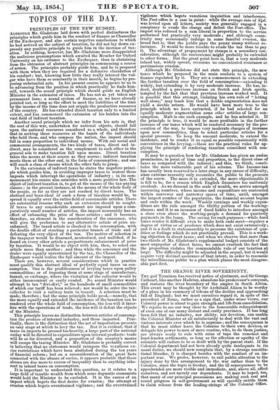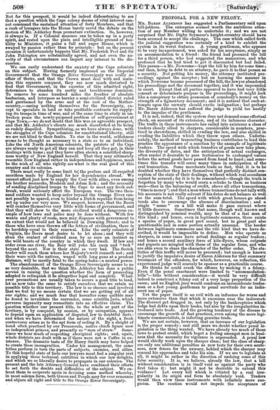T11 - F, ORANGE RIVER SOVEREIGNTY.
THE god Terminus has received notice of ejectment, and Sir George Cathcart, like another Hadrian, abandons his predecessor's conquest,• and restores the river boundary of the empire in South Africa. This event may be thought by Sir Archibald Alison to be worthy of a place in his summary of tokens of the decline and approaching fall of England ; but we must ourselves regard it, in spite of the precedent of Rome, rather as a sign that, under wiser views, our Colonial power is about to gain strength and life from consolidation.. We rejoice to see our way clear to the honourable relinquishment of even one of our many distant and costly provinces. It has long been felt that no industry, nor ability, nor devotion, can enable the Colonial Minister at all satisfactorily to deal with the vast and various interests over which he is supreme ; and the consequence is that he must either leave the Colonies to their own devices, or delegate his power to men of mere routine, who, to do them justice, are always ready to rule with reins of tape the remotest and least-known settlements, so long as the affection or apathy of the colonists will endure to be so dealt with by the parent state. If the Colonial department had not been already quite inadequate to its iptono !cute:a:rid NoVrnaeerl .e ba We
usual duties, we should now complain that, by a strange constitu- tional blunder, it is charged besides with the conduct of an Un-
thfe sopmrarrangemente fet hr ,e how evert leading-strings t ot h c a 1 le woapfrn public iec a attention
Colonial 0:them
to the Colonies, since the topic is fresher, and the ill consequences to be apprehended are more visible and immediate, and, above all, affect ourselves, and not merely our dependents. It may be hoped, too, that many of our principal possessions are making such real and sound progress in self-government as will speedily enti. tle them•
But for this prospect, it would be indeed disheartening to see that a question which the Cape colony deems of vital interest can- not command the sustained attention of forty Members, and that a rush of loungers into the House barely saved the debate on the motion of Mr. Adderley from premature extinction. So, however, it always is. If a Colonial measure can be taken up in a party spirit, and rested upon the plain and intelligible ground of hos- tility to Ministers, it gains a full and eager House, which is swayed by passion rather than by principle : but on the present occasion it unfortunately happens that Mr. Frederick Peel and Sir John Pakington are substantially agreed, and not even the no- velty of that circumstance can impart any interest to the dis- cussion.
We can easily understand the anxiety of the Cape colonists on this subject. Having formerly impressed on the Imperial Government that the Orange River Sovereignty was really no affair of theirs, and that the Crown must deal with and main- tain this separate conquest, they are now much disturbed to find that Government, in the exercise of this admitted right, determines to abandon its costly and troublesome dominion. To remove by some hundred miles the frontier of absolute
barbarism, and inter as barrier a semi-civilized district ruled and garrisoned bytsearms and at the cost of the Mother- country,—caring nothing themselves for the Sovereignty, ex- cept to speculate in land or take profitable contracts for supply- ing its troops in time of war, and at the same time to study in un- broken peace the newly-proposed problem of self-government at Cape Town,—we do not doubt that this was an agreeable prospect, and that Mr. Adderley's clients are much dissatisfied at its being so rudely dispelled. Sympathizing, as we have always done, with the struggles of the Cape colonists for constitutional liberty, still we are not blind to their faults. To rise in the world, selfishness seems to be thought as necessary to a state as to an individual. Like the old North American colonists, the patriots of the Cape are always ready to get all they can and keep all they get, in their dealings with home ; and they have often shown a sanctified sharp- ness worthy of New England herself. That they may ultimately resemble New England rather in independence and happiness, must be the wish of all who rightly see what is the real good of this country and its colonies.
There must really be some limit to the profuse and ill-requited sacrifices made by England for her dependencies abroad. We cannot afford just now to supply the Czar with allies, even among his brother monarchs, Moshesh and Adam Kok ; and the necessity of sending disciplined troops to the Cape to meet any fresh out- break, would seriously affect the European war. The two thou- sand soldiers wanted to keep order beyond the Orange River can- not possibly be spared, even to hinder a Dutch republic from being set up under our very nose. We suspect, however, that the Boers will cumber themselves very little with forms of government, and that they will show to the more civilized world a dangerous ex- ample of how laws and police may be done without. With few wants and plenty of room, men may dispense with government to an extent that would not be believed in Downing Street; and to those who have once thrown off the fetters of civilization, there is no hardship equal to their renewal. Like the early colonists of Virginia, the Boers most desire to be let alone ; and they will shun the contact of civilized man by as sure an instinct as the wild beasts of the country in which they dwell. If law and order cross one river, the Boer will yoke his oxen and " trek " beyond the next. Nor is their state so very bad. The Scotch trader will reach them where her Majesty's writ runneth not ; and their wars with the natives, waged with long guns at a prudent distance, will be mostly fatal to the spring-boks—a neutral. power.
The abandonment of the Orange River Sovereignty seems to us so very desirable, that we think Mr. Adderley has done a public service in raising the question whether the form of proceeding adopted to relinquish it be altogether legal and complete. What- ever precautions are usually taken to secure a good title to land, let us now take the same to satisfy ourselves that we retain no possible title to this territory. The law is so obscure and involved that we feel by no means certain that we are getting rid of all our rights ; and we much fear that hereafter some quibble may be found to invalidate the surrender, some scintilla juris, which perverse ingenuity may resuscitate into an effective claim. The question whether our present title, to the whole or part of the territory, is by conquest, by cession, or by occupation, appears to depend upon an application of disputed, law to doubtful facts : and when we have determined the nature of the right, a fresh controversy arises as to the apt form of ceding it. By a sleight of hand often practised by our Proconsuls, native chiefs figure now as independent princes, and presently as " men of straw." Some- times we hear much of respecting aboriginal rights; and, again, whole districts are dealt with as if there were not a Caffre in ex- istence. The dramatic taste of Sir Harry Smith may have helped to create these incongruities. Under his management, the same tribes perform in turn the parts of subjects, enemies, and allies. To this hopeful state of facts our lawyers must feel a singular zest in applying those technical subtilties in which our law delights, and which we so liberally desire to propagate in our colonies. The present and the late Attorney-General have combined their efforts to set forth the doubts and difficulties of the subject. We en- treat them to cooperate again in devising some method whereby, in most solemn form, both Queen and People may for ever renounce and abjure all right and title to the Orange River Sovereignty.



































 Previous page
Previous page